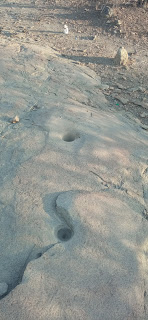Between Morán Mount and Platillos
A trekking trail connecting at least three sites with archaeological evidence in Malingas.
Photographs gathered by Milton Garcia Navarro
TAMBOGRANDÉ, Peru – In 2011, FACTORTIERRA announced to the world the existence of an archaeological rests network that could be until 4000 years old, located at the central part of Malingas Community. Basically, it’s about evidences of art-on-the-rock on and around Malingas Cord, a branch formed by five mounts apparently caused by volcanic activity judging the basalt that mostly forms their slopes.
More than a decade later,
it’s starting to value the touristic potential the zone has, despite the sites
have not officially confirmed yet, they just have a preliminary survey by the archaeologist Daniel Dávila Manrique, the first scientific explorer of the zone
between 2010 and 2011.
“I’d like to return, make a
new survey of every site,” Dávila said to FACTORTIERRA, when he learned about
the initiative of giving them a touristic use. In fact, he thinks that a way to promote and conserve them is thinking about
a future archaeological park for Malingas.
One of the evidences that
called the attention much is a petroglyph located at the summit of Morán Mount, the
highest of Malingas Cord (1017 feet altitude, according to Dávila’s survey in
2011), that could be part of the so-called Samanga Tradition, a type of stylized art that could be developed during the
Formative Period (2000 to 200 BC) across the eastern half of Piura Department when the people, maybe Amazonian origin, still migrated looking
for water and lands before the first cultures formed. Similar rests are
appreciated along Quiroz sub-Basin,and also Sapillica as
FACTORTIERRA verified it in 2016.
The Milton’s Route
At the base of Morán Mount, Cruz
Verde Village (a little more than 600 inhabitants), lives the Tourism graduate
Milton Garcia Navarro who, interested in the investigation made by FACTORTIERRA,
asked what would happen if the sites could be used for tourism. Near his house,
there is a petroglyph, or a
drawing carved on the rock, known as Monkey’s because the shape suggests an ape
although it doesn’t exist in actual historic times.
A Little further, in Cruz
Verde School, there are still bowls sculpted on some little rocks that just
reach below your knees, depending on your height. Archaeologist Dávila suggests
they were made by rubbing sandd with a rock doing circle movements. As the
outer layers of the stone break much easily, the circle pattern was relatively
simple to get. Its use is not clear yet.
Milton recommends from here
to start a 1.5-hour climb, in normal physical condition, toward Morán Mount’s
summit to find a petroglyph designed within three huge rocks looking like an
altar. Let’s add that from the Summit it’s posible to see a beautiful view of
the whole San Lorenzo Valley until El éreo Mount (2113 feet altitude) located about 31 miles
away. Turning around, it’s possible to see Districts Chulucanas and La Matanza
until Vicús Mount (1579
feet altitude), located about 19 miles to the south.
With the strength recovered, you go downhill leaving
Cruz Verde aside until getting to Platillos (324 feet altitude), with its
enigmatic hill made of pure rock which summit has some sculpted bowls those
give the town’s name in Spanish. The view of Malingas Cord and the Andean Range
is overwhelming. It’s also the end of the Trail. According to Daniel Dávila,
its clear this place could have a ceremonial purpose, it seems to be near the
suggested trace for the Coastal Inca Trail which he also explored between 2010 and 2011.
According to Milton Garcia Navarro,
going between both points just needs one morning or one afternoon to take. It’s
possible to access from Tambograndé City, (13 miles) as much as Chulucanas City (16
miles). For more information, you can contact him on his Facebook account.
© 2022 Asociación Civil Factor Tierra. All Rights Reserved. Comment this in the box below or on our Facebook and Twitter accounts. Would you like to know the places featured in this entry? Write us at factortierra@gmail.com for for more information.







Comentarios
Publicar un comentario